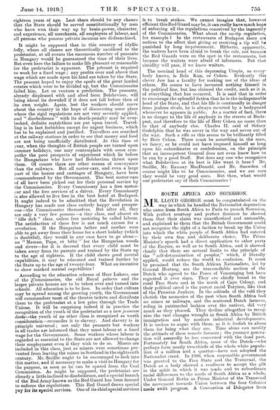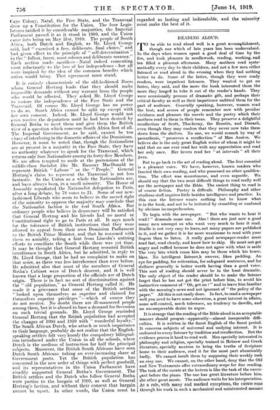SOUTH AFRICA AND SECESSION.
MR. LLOYD GEORGE must be congratulated on the way in which he handled the Nationalist deputation who came from South Africa to Paris to preach Secession. With perfect courtesy and perfect firmness he showed them that their claim was unauthorized and untenable, and explained to them that the British Government could not recognize the right of a faction to break up the Union into which the white people of South Africa had entered by their own free and deliberate choice. The Prime Minister's speech had a direct application to other parts of the Empire, as well as to South Africa, and it showed clearly that there are natural limits to the principle of the "self-determination of peoples," which, if literally applied, would reduce the world to confusion. It must be premised that the South African Nationalists, led by General Hertzog, are the irreconcilable section of the Dutch who agreed to the Peace of Vereeniging but have regretted it ever since. They are chiefly found in the rural Free State and in the north of Cape Colony, and their political creed is the purest racial Toryism, like that of the Prussian Junkers. In the solitude of the veld they cherish the memories of the past when South Africa had no mines or railways, and the scattered Dutch farmers, ruling in patriarchal fashion over the natives, did very much as they pleased. They decline altogether to recog- nize the vast changes wrought in South Africa by British inonignition and by modern industrial developments. It is useless to argue with them, as it is foolish to abuse them for being what they are. Time alone can modify the attitude of these remote farmers ; the younger genera- tion will assuredly be less concerned- with the dead past. Fortunately for South Africa, most of the Dutch—who perhaps form nearly two-thirds of the whole white popula- tion of a million and a quarter—have not adopted the Nationalist creed. In 1906, when responsible government was granted to the Free State and the Transvaal, the Dutch as a body showed a readiness to accept the gift in the spirit in which it was made and to subordinate racial differences to the needs of South Africa as a whole. Under General Botha as Prime Minister of the Transvaal the movement towards Union between the four Colonies macle swift progress. A Convention of Delegates from Cape Colony, Natal, the Free State, and the Transvaal drew up a Constitution for the Union. The four Legis- latures ratified it by considerable majorities, the Imperial Parliament passed it as it stood in 1909, and the Union came into being on May 31st, 1910. The people of South Africa, both Dutch and English, as Mr, Lloyd George said, had " exercised a free, deliberate, final choice," and had given effect to the principle of " self-determination " in the " fullest, freest, most solemn and deliberate manner." Each section made sacrifices—Natal indeed consenting most reluctantly to the loss of her independence—but all were inspired by the idea of the common benefits which union would bring. That agreement must stand.
It is entirely characteristic of the old-fashioned Boers whom General llertzog leads that they should make impossible demands without any warrant from the people who would be affected. They asked Mr. Lloyd George to restore the independence of the Free State and the Transvahl. Of course Mr. Lloyd George has no power to do so. South Africa cannot be split up except with her own consent. Indeed, Mr. Lloyd George would not even receive the deputation until he had been desired by General Botha to meet them and give them the British view of a question which concerns South Africa first of all. The Imperial Government, as he said, cannot be too chary of interfering in the domestic affairs of the Dominions. However, it must be noted that, though the Nationalists are at present in a majority in the Free State, they have no authority whatever to speak for the Transvaal, which returns only four Nationalists among its forty-five Members. We are often tempted to smile at the pretensions of the middle-class Socialist like Mr. Ramsay MacDonald to represent British "Labour" or the "People." General Hertzog's claim to represent the Transvaal is not less fantastic. In the Union as a whole the Nationalists are, and have always been, in a small minority. The House of Assembly repudiated the Nationalist delegation to Paris, after a long debate, by 78 votes to 24. Some of our new- fashioned Liberals who seem to believe in the sacred right of the minority to oppress the majority may conclude that the Nationalist faction is the real South Africa. But ordinary people who believe in democracy will be satisfied that General Hertzog and his friends had no moral or Constitutional right to go to Paris at all. It says much for the tolerance of British institutions that they were allowed to appeal from their own Dominion Parliament to the British Prime Minister, and that he reasoned with them so amiably, taking a hint from Lincoln's untiring efforts to conciliate the South while there was yet time. It may be thought that General Hertzog resented British interference in South Africa, but he admitted, in reply to Mr. Lloyd George, that he had no complaint to make on that score, as there was less interference than ever before. He admitted also that most of the members of General Botha's Cabinet were of Dutch descent, and it is well known that a large proportion of the officials are of Dutch origin: There is in fact no sort of discrimination against the old population," as General Hertzog called it. He made it a grievance that some of the British settlers "looked upon themselves as superior and claimed for themselves superior privileges "—which of course they do not receive. No doubt there are ill-mannered people among them, but it is absurd to base a demand for Secession on such trivial grounds. Mr. Lloyd George reminded General Hertzog that the British population had accepted the changes of 1906 and 1910 with ` wonderful loyalty." The South African Dutch, who attach so much importance to their language, probably do not realize that the English- speaking settlers felt very keenly the compulsory bilingual- ism introduced under the Union in all the schools, where Dutch is the medium of instruction for half the principal subjects. Moreover, the British South Africans have seen Dutch South Africans taking an ever-increasing share of Government posts. Yet the British population has concurred in the new order of things with perfect goodwill, and its representatives in the Union Parliament have steadily supported General Botha's Government. The British settlers and the Dutch who follow General Botha were parties to the bargain of 1909, as well as General Hertzog's faction, and without their consent that bargain cannot be upset. In other words, the Union must be regarded as lasting and indissoluble, and the minority must make the best of it.



































 Previous page
Previous page